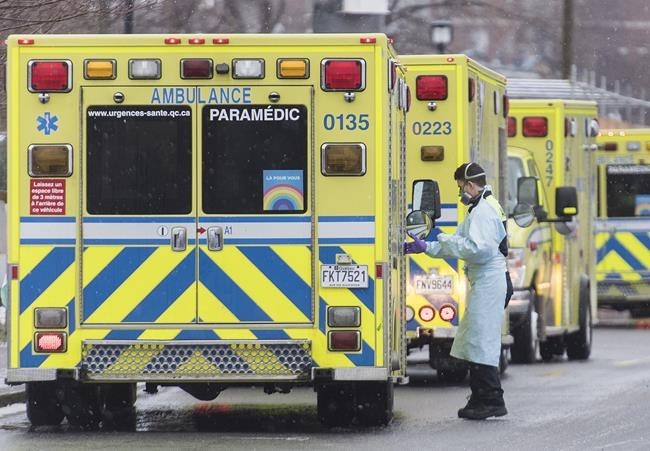Ontario is planning to ramp up COVID-19 vaccinations after facing criticism for scaling down operations over the holidays, while Alberta acknowledges it over-estimated how quickly it would be able to get shots into people's arms.
Retired Gen. Rick Hillier, who is leading Ontario's vaccine program, said the decision to close clinics over Christmas Day and Boxing Day was the wrong one.
"We've heard the voices of the people of Ontario saying 'get on with this' and that's what we are going to do," he told a news conference Tuesday.
"We will not take any more days off."
In Alberta, the government had initially expected to have 29,000 people vaccinated by the end of the year, but with two days left only about 7,000 health workers had been given their shots.
Alberta Premier Jason Kenney partly blamed missing the goal on a decision by health officials to hold back half of the province's allotted doses of the Pfizer-BioNTech vaccine, so that a second shot could be given as called for in the protocol.
Kenney said the government will now end the holdback and count on future shipments for the second doses. Changes to the rules on where the Pfizer-BioNTech vaccine can be given and booking appointments on New Year's Day should also speed things up, he said.
"My understanding is that we are scheduled to do about 4,000 additional vaccinations in the next couple of days — two or three days," Kenney told a news conference.
"We hope to start catching up towards that goal."
At least 71,000 doses of the Pfizer-BioTech vaccine had been administered across Canada as of Tuesday evening, according to a vaccine tracker run by a University of Saskatchewan student based on official updates from each province.
Hillier said more than 14,000 people in Ontario had received their first dose of the Pfizer-BioNTech shot as of Tuesday morning. That number put the province behind the rest of the country with about 95 vaccinations per 100,000 people. In comparison, Quebec had administered 22,500 doses or about 265 per 100,000.
In British Columbia, provincial health officer Dr. Bonnie Henry said almost 12,000 people have been vaccinated with the Pfizer-BioNTech vaccine.
Hillier said he has asked Health Canada to look into whether the second approved vaccine, made by Moderna, could be used as a single dose rather than two, allowing millions of people to get immunized faster.
"Maybe with the high efficiency that protects you in the first needle, it would be best for the entire population if we went with just a one-shot vaccination program with Moderna," he said.
Health Canada's chief medical adviser, Dr. Supriya Sharma, who is tasked with overseeing approval of vaccines, said last week that officials are still recommending a second dose.
"We would say give the first dose and then make sure you can give a second dose in a month," she said at the time.
Hillier said Ontario is expected to receive roughly 50,000 doses of the Moderna vaccine by Wednesday, with vaccinations in long-term care homes set to follow within 48 to 72 hours.
Meanwhile, the Moderna vaccine started arriving in the North on Tuesday with both the Northwest Territories and Yukon receiving their first shipments.
N.W.T. Health Minister Julie Green said in a tweet that the territory received 7,200 doses and vaccinations are to start with elders the week of Jan. 11.
Health and Social Services Minister Pauline Frost said Yukon also received 7,200 doses and more shipments are expected in early January. She said teams are being trained before vaccinations start next week, immunizing vulnerable groups first, such as high-risk long-term care residents and staff.
Ontario reported nearly 4,500 new cases of COVID-19 over the past two days and Quebec said it had 2,381 new infections in the past 24 hours. Alberta reported 879 new cases of COVID-19 and 26 additional deaths.
Manitoba reported 133 new cases Tuesday and Saskatchewan said it has had 208 new cases in the past two days. There was one new case in Newfoundland and two cases each in Nova Scotia, New Brunswick and Prince Edward Island. British Columbia reported 2,206 new cases over the past five days and 74 additional deaths.
Quebec became the fourth province Tuesday to confirm its first case of the variant of the virus that is believed to be more contagious. It was first identified in the United Kingdom and the province is calling for rapid testing at airports.
Three other provinces have confirmed cases of the variant in recent days, with three cases in Ontario, one in Alberta and one in British Columbia.
— With files from Paola Loriggio in Toronto, Emma Tranter in Iqaluit, Nunavut, Stephanie Taylor in Regina, and Terri Theodore in Vancouver.
This report by The Canadian Press was first published Dec. 29, 2020.
Colette Derworiz, The Canadian Press

